Niche: Explained
In ecology, a niche refers to the specific role or position of an organism within its environment, including its habitat, its interactions with other species, and its unique adaptations. It encompasses the resources the organism uses, how it interacts with other organisms, and its effect on the surrounding environment.
Components of a Niche
A niche includes the following components:
- Habitat: The specific environment where the organism lives.
- Resources: The food, water, shelter, and other essentials the organism needs to survive.
- Interactions: How the organism interacts with other species, including competition, predation, and symbiosis.
- Adaptations: The unique traits and behaviors the organism has developed to survive in its environment.
Types of Niches
There are two main types of niches:
- Fundamental Niche: The full range of conditions and resources an organism can potentially use and the roles it can potentially play in the environment.
- Realized Niche: The actual conditions and resources an organism uses and the roles it plays in the environment, taking into account competition and other environmental factors.
Study Guide: Understanding Niche
Here are some key points to understand about the concept of niche:
- Describe what a niche is and its importance in ecology.
- Explain the components of a niche and how they contribute to an organism's role in its environment.
- Discuss the differences between fundamental and realized niches.
- Give examples of different types of niches in various ecosystems.
- Analyze how changes in a niche can impact an organism and its interactions with other species.
By understanding the concept of niche, one can gain insights into how organisms are uniquely adapted to their environments and how their interactions shape the ecosystems they inhabit.
[Niche] Related Worksheets and Study Guides:
.◂Science Worksheets and Study Guides Fourth Grade. Invertebrates - Animals without Backbones
Study Guide Invertebrates - Animals without Backbones
Invertebrates - Animals without Backbones  Activity Lesson
Activity Lesson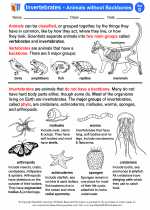 Invertebrates - Animals without Backbones
Invertebrates - Animals without Backbones  Worksheet/Answer key
Worksheet/Answer key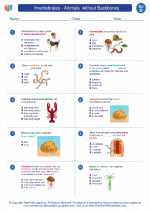 Invertebrates - Animals without Backbones
Invertebrates - Animals without Backbones  Worksheet/Answer key
Worksheet/Answer key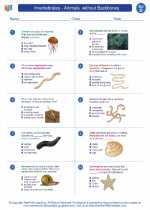 Invertebrates - Animals without Backbones
Invertebrates - Animals without Backbones  Worksheet/Answer key
Worksheet/Answer key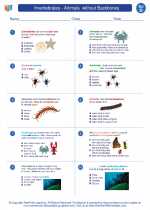 Invertebrates - Animals without Backbones
Invertebrates - Animals without Backbones  Worksheet/Answer key
Worksheet/Answer key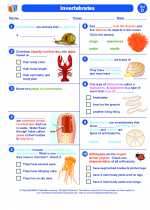 Invertebrates
Invertebrates  Vocabulary/Answer key
Vocabulary/Answer key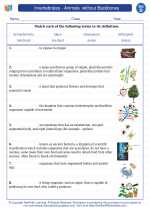 Invertebrates - Animals without Backbones
Invertebrates - Animals without Backbones  Vocabulary/Answer key
Vocabulary/Answer key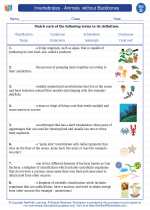 Invertebrates - Animals without Backbones
Invertebrates - Animals without Backbones  Vocabulary/Answer key
Vocabulary/Answer key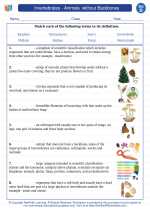 Invertebrates - Animals without Backbones
Invertebrates - Animals without Backbones  Vocabulary/Answer key
Vocabulary/Answer key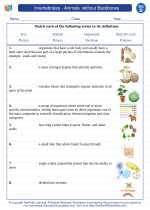 Invertebrates - Animals without Backbones
Invertebrates - Animals without Backbones  Vocabulary/Answer key
Vocabulary/Answer key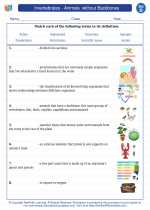 Invertebrates - Animals without Backbones
Invertebrates - Animals without Backbones 

 Activity Lesson
Activity Lesson
 Worksheet/Answer key
Worksheet/Answer key
 Worksheet/Answer key
Worksheet/Answer key
 Worksheet/Answer key
Worksheet/Answer key
 Worksheet/Answer key
Worksheet/Answer key
 Vocabulary/Answer key
Vocabulary/Answer key
 Vocabulary/Answer key
Vocabulary/Answer key
 Vocabulary/Answer key
Vocabulary/Answer key
 Vocabulary/Answer key
Vocabulary/Answer key
 Vocabulary/Answer key
Vocabulary/Answer key

The resources above cover the following skills:
Life Science: The students will use scientific skills and processes to explain the dynamic nature of living things, their interactions, and the results from the interactions that occur over time.
Diversity of Life: Explain how animals and plants can be grouped according to observable features.
Classify a variety of animals and plants according to their observable features and provide reasons for placing them into different groups.